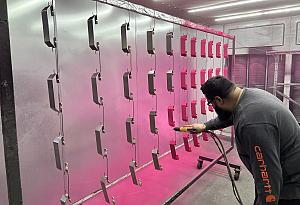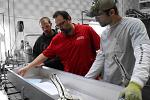Senior Editor
- FMA
- The Fabricator
- FABTECH
- Canadian Metalworking
Categories
- Additive Manufacturing
- Aluminum Welding
- Arc Welding
- Assembly and Joining
- Automation and Robotics
- Bending and Forming
- Consumables
- Cutting and Weld Prep
- Electric Vehicles
- En Español
- Finishing
- Hydroforming
- Laser Cutting
- Laser Welding
- Machining
- Manufacturing Software
- Materials Handling
- Metals/Materials
- Oxyfuel Cutting
- Plasma Cutting
- Power Tools
- Punching and Other Holemaking
- Roll Forming
- Safety
- Sawing
- Shearing
- Shop Management
- Testing and Measuring
- Tube and Pipe Fabrication
- Tube and Pipe Production
- Waterjet Cutting
Industry Directory
Webcasts
Podcasts
FAB 40
Advertise
Subscribe
Account Login
Search
How to overcome metal fabrication’s recruitment challenge
Those who succeed in manufacturing start with fascination and a healthy dose of realism
- By Tim Heston
- December 7, 2020
- Article
- Shop Management

Many who enter metal fabrication are fascinated by it all and never leave. The hard part is finding those susceptible to the manufacturing bug. Getty Images
A fabrication industry recruiter recently called to chat, and during our conversation he asked me a question: What kind of talent will metal fabrication need in the years to come? The recruiter turned the tables on me. As an industry reporter, I’m usually the one doing the asking. Spurred by that question, though, I blathered for about 40 minutes. Truth is, I really don’t have a definitive answer. It probably depends on the company’s needs and shop culture. All I know is there’s probably more to it than having basic mechanical aptitude. Many managers tell me they hire for attitude and engagement, the soft skills that will help the operation grow into the future. But what does “attitude and engagement” really mean?
Although I lack succinct answers, I’ve got plenty of anecdotes, hence my blathering. Over the years I’ve talked with hundreds of people who work in shops specializing in a range of work, from precision sheet metal to heavy plate and vessel fabrication. They’re all different, but the ones who stand out share a common trait: a healthy dose of realism.
Several years ago I spoke with Ken Roostee, a (now retired) shop planner at Metcam, a precision sheet metal operation north of Atlanta. A true sheet metal guru, he sat me down and showed me some beautifully crafted static nests for the punch press revealing incredibly high material yields and microtabs put just in the right place for process stability and easy denesting, no arduous shake-and-breaks required.
Decades ago, arriving in Atlanta from out west, Roostee paged through the phone book business section (remember those?). He didn’t call the sheet metal shops, though. He wanted the unfiltered truth, so he called the machine shops—those who supplied and collaborated with the sheet metal operations—to see which were the best in town. Metcam’s name kept coming up.
The late Dick Kallage, longtime industry consultant and former columnist for this magazine, used to say, “Truth happens on the shop floor.” More fundamentally, fabrication folks value the ungarnished truth, where the metal meets the tool, where operational realities cut away the bull. A part is fabricated on time and to spec, or it’s not.
Admittedly, real life in the fab shop can be messy and unpredictable. (What do you mean the customer wanted that job yesterday!?) Still, people usually argue not about the conceptual but about the tangible: quality requirements, delivery dates, fabrication technique. It’s all concrete stuff.
I see this realism as a foundation, and how people build upon that realism dictates where their career goes. Those who climb the highest (or at least seem to have the most fun) usually take a path that lies somewhere along a spectrum of jobs. At one end we have the technology-focused process gurus, those who focus on a single puzzle piece. At the other end are systems-thinkers, those who think about how all the puzzle pieces fit together.
Fitting into the former category are code-level welders who scrutinize every microinch of their weld bead, technical leads in the bending department, and seasoned programmers in the cutting department. They start their careers by shadowing other gurus, and their curiosity sets them apart. They’re truly fascinated by the work in front of them, and the details behind what they see drive them to learn more.
Systems-thinkers, on the other hand, might start as a helper or a shipping clerk, but they certainly don’t end their careers in the same place. They’re at home in an environment that values cross-training. The more they learn about the operation as a whole, the happier they are. They embrace software, the concepts behind Industry 4.0, and virtually anything else that aims to streamline work flow. Eventually they might end up in operations management or perhaps in estimating or sales.
Few people are entirely process- or systems-focused; most are somewhere along the spectrum between the two extremes. A specialized electron beam welding operation will likely have more process-focused people, while a fabricator serving diverse markets probably will have more systems-oriented folks. Regardless, most companies have some combination, and how well these very different people work together can determine how well a shop performs overall. The best people in a shop might think differently, but they’re all in the moment, engaged, and thinking.
Not everyone is engaged and in the moment. Some clock in, go through the motions, and clock out. Why? Well, let’s be honest. Fabricators are no strangers to those who have personal issues, people who have trouble passing a drug test, or employees who are just in the wrong career.
Sometimes the environment is to blame. I’ve talked to people who worked in shops where tenure was more valued than talent, where the resistance to even the smallest change seemed insurmountable, and where trust was nonexistent. Yet even these environments can be great poaching grounds. I spoke with one operations manager (on background, for obvious reasons) who came from such an environment. The boss, who had inherited the business from his father, wasn’t a people person. He installed cameras in the shop and disciplined anyone who left their station for too long. Several co-workers (including the operations manager I spoke with) left to launch what is now a successful fab shop.
Whether enamored by the technology itself or how all that technology and related processes fit together, the best in this business find their way to success. The hard part is identifying those destined for such success. But once they’re here, they’re fascinated by it all. They catch the manufacturing bug and, more often than not, are here to stay.
About the Author

Tim Heston
2135 Point Blvd
Elgin, IL 60123
815-381-1314
Tim Heston, The Fabricator's senior editor, has covered the metal fabrication industry since 1998, starting his career at the American Welding Society's Welding Journal. Since then he has covered the full range of metal fabrication processes, from stamping, bending, and cutting to grinding and polishing. He joined The Fabricator's staff in October 2007.
subscribe now

The Fabricator is North America's leading magazine for the metal forming and fabricating industry. The magazine delivers the news, technical articles, and case histories that enable fabricators to do their jobs more efficiently. The Fabricator has served the industry since 1970.
start your free subscription- Stay connected from anywhere

Easily access valuable industry resources now with full access to the digital edition of The Fabricator.

Easily access valuable industry resources now with full access to the digital edition of The Welder.

Easily access valuable industry resources now with full access to the digital edition of The Tube and Pipe Journal.
- Podcasting
- Podcast:
- The Fabricator Podcast
- Published:
- 04/16/2024
- Running Time:
- 63:29
In this episode of The Fabricator Podcast, Caleb Chamberlain, co-founder and CEO of OSH Cut, discusses his company’s...
- Industry Events
16th Annual Safety Conference
- April 30 - May 1, 2024
- Elgin,
Pipe and Tube Conference
- May 21 - 22, 2024
- Omaha, NE
World-Class Roll Forming Workshop
- June 5 - 6, 2024
- Louisville, KY
Advanced Laser Application Workshop
- June 25 - 27, 2024
- Novi, MI































